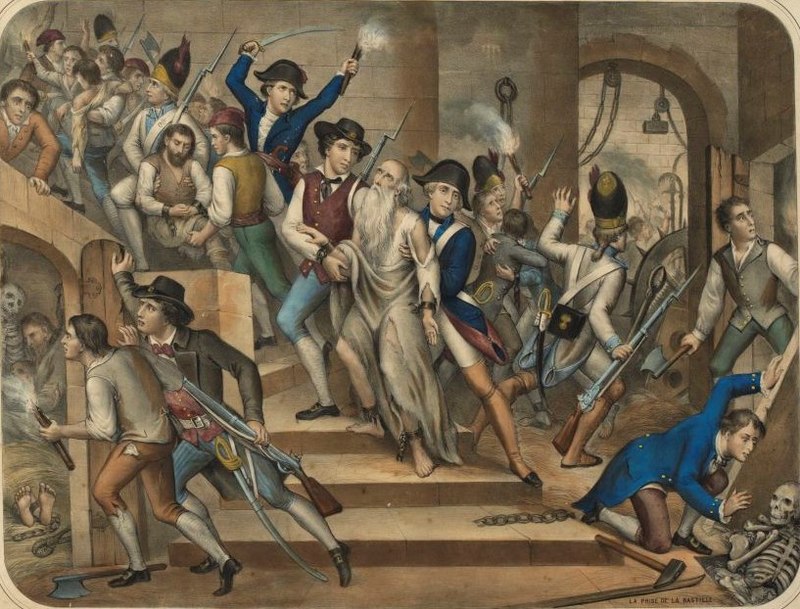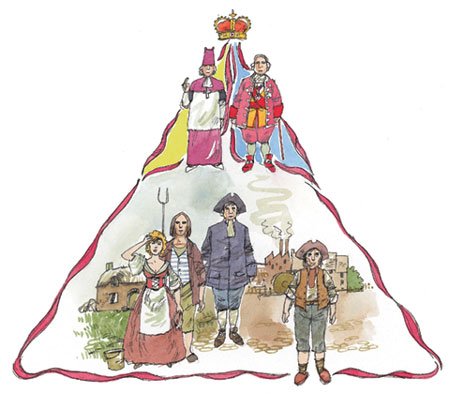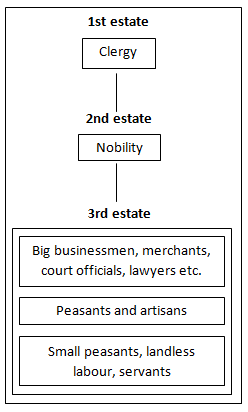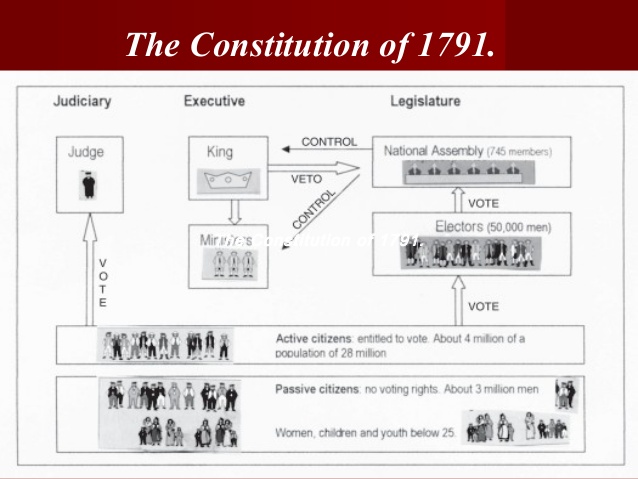 | e-NOTES (2060 [C] ) | ||
| 9th (History) | |||
| French Revolution I | |||
French Society During Late 18th CenturyThe French Revolution is known as a landmark in the history of Europe and the world. It led to end of monarchy in France. A new system of governance was introduced. The Declaration of the Rights of Man and Citizen during the French Revolution announced the coming of a new era. The slogan of French Revolution liberty, freedom and equality became important ideas of new era. French Society during The Late 18th Century In 1774, Louis XVI of the Bourbon family became the king of France. He was 20 years old and married the Austrian princess Marie Antoinette. ‘When he became the ruler, he found an empty treasury, because years of wars and an extravagant lifestyle had drained the financial resources of France. The cost of maintaining court at the immense palace of Versailles also added to the problem. To maintain court he took more than 2 billion livres loan. Under, Louis XVI France helped the thirteen American colonies to gain their independence from their common enemy Britain. The war added more ‘than a billion livres to a debt. Due to this situation, credit lenders of state began to charge 10% interest on loans. It became difficult for the French Government to meet its regular expenses such as maintaining army, the court, etc. Thus, the government was forced to increase taxes. THERE IS A SHORT NOTE ABOUT FRENCH REVOLUTION The monarch of France was King Louis XVI at the time of French Revolution and prior to that as well. The king had ascended the throne in 1774 who lived in Versailles. In the 18th Century wars with Europe and America had led to a loss in the treasury and national debts amounted to approximately 3 billion livres. Therefore the King at that time increased taxation. Later on improvements in the education system was sought as new ideas led to new class of people emerging in the Third Estate(commoners) at the time. The society was divided into 3 states, clergy, nobility and commoners.
| |||
Structure -Social Status of French SocietyStructure and Social Status of French Society in 18th Century: In the 18th century, French society was divided into three estates The Church took taxes called tithes from the peasants. All members of the third estate had to pay taxes to the state. This included taitle, a direct tax and a number of indirect taxes imposed on articles of everyday consumption like salt or tobacco. This estate alone had burden of financing activities of state.
The Struggle to Survive: During 1715-1789, the population of France increased from 23 to 28 million. This led to a rapid increase in demand for food grains. But the production did not increase. The price of bread rose rapidly. It was the staple diet of the majority. Most workers were employed as labourers in workshops, whose owners fixed their wages. Their wages did not keep pace with the rise in prices. So, the gap between the poor and the rich widened. It became worse when bad weather conditions reduced the harvest. This frequently created a subsistence crisis. A Growing Middle Class Envisages an End to Privileges In the past, peasants and workers had participated in revolts against increasing taxes and food scarcity. But they lacked the sources and programmes to carry out full scale measures that would bring about a change in the social and economic order. This was left to the groups of the third estate who had become prosperous and had access to education and new ideas. | |||
Emergence of Middle ClassEmergence of Middle Class: In the 18th century, a new social group emerged who were known as the middle class. They had become rich by expanding of overseas trade and manufacturing goods. In addition to merchants and manufacturers, there were lawyers and administrative officials, who were educated. They believed that no group of society should be privileged by birth. Role of Philosophers On Emergence of Middle Class: Philosophers like john Locke, Jean Jacques Rousseau and Montesquieu considered the middle class was sole responsible for revolution. They spread the ideas of Freedom, equal laws and oppurtunities for all. | |||
Role of Philosophers on Emergence of Middle ClassRole of Philosophers on Emergence of Middle Class: Philosophers like John Locke, Jean Jacques Rousseau and Montesquieu considered the middle class was sole responsible for revolution. They spread the ideas of freedom, equal laws and opportunities for all. | |||
Impact of Ideas of PhilosophersImpact of Ideas of Philosophers: The model of government given by Montesquieu was put into force in the USA after the thirteen colonies declared their independence from Britain. | |||
Outbreak of RevolutionThe circumstances leading to outbreak of revolutionary protest in France Assembly of the Estates General Louis XVI called for an assembly of the Estates General on 5th May, 1789 to pass the proposal for new taxes. In Versailles, an attractive and impressive hall was prepared to host the delegates. The first and second estates sent 300 representatives each, who were seated in rows facing each other on two sides. The 600 members of the third estate had to stand at the back. The third estate was represented by its more prosperous and educated members. Peasants, artisans and women were denied entry to the assembly but they sent their demands and grievances through representatives. These were listed in some 40000 letters. Demand for Voting in Democratic Way In earlier voting system of Estates General, each estate had one vote. This time also, Louis XVI wanted to continue the same system. But the members of third estate demanded that voting should be conducted by taking assembly as a whole. They demand that each member should have one vote but this proposal was rejected by the king. This idea was supported by Rousseau in his book ‘The Social Contract’. After the rejection of this proposal the members of third estate walked out of assembly in protest. National Assembly of Third Estate On 20th June, the representatives of the third estate assembled in the hall of an indoor tennis court in Versailles. They declared themselves a National Assembly. They also swore to draft a new Constitution for France that would limit the powers of the monarch. The representatives of the third estate were led by Mirabeau and Abbé Sieyès. Mirabeau was born in a noble family, but discarded his feudal privileges. Mirabeau brought out a journal and delivered powerful speeches to the crowd to inspire them at Versailles. Abbé Sieyes was originally a priest. He wrote an influential pamphlet called ‘What is the Third Estate?’ | |||
Revolt Starts at the BastilleRevolt Starts at the Bastille:  | |||
End of Special PrivilegesEnd of Special Privileges: Seeing the power of revolt, Louis XVI recognised the National Assembly. He accepted that his powers would be checked by a Constitution. On the night of 4th August, 1789, France passed the law for abolishing the feudal system of obligations and taxes. The members of clergy were also forced to give up their privileges. Tithes were abolished and lands owned by the Church were seized by authority. By this, the government acquired assets worth at least 2 billion livres. Peasants protest against the end of special privileges(fedual lords or nobles of France) In the countryside, there were rumours that the landlords of the manor had hired criminals to destroy the ripe crops of the peasants. Being afraid of the situation , peasants in several districts seized hoes and pitchforks and attacked chateaux( castles belonging to the noblemen). They looted the hoarded grain. they also burnt down documents containing records of manorial dues. as a result, a larger number of nobles fled from their home towns and migrated to neighbouring countries. | |||
France Becames a Constitutional MonarchyFrance Becomes a Constitutional Monarchy: The National Assembly completed the draft of the Constitution in 1791. Its main objective was to limit the powers of the monarch. Now, the powers were separated and assigned to different institutions like the Legislature, Executive and Judiciary. This change of powers made France a constitutional monarchy. The Laws Made by the National Assembly: The highlights of the changed system are: | |||
 | |||

Powered by ABHYAS ChatBOT.

What describes you best?

I am a Student
I am a Tutor
I am a School Owner
I want to appear for Govt. Exams



